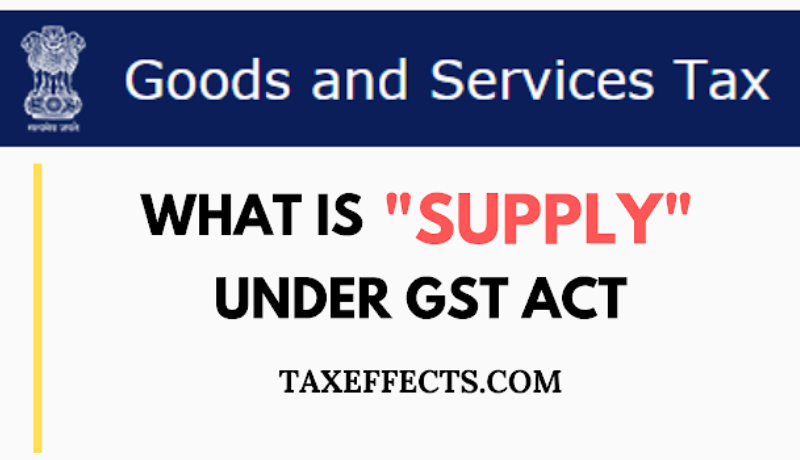Before the introduction of GST Act, there were different kind of taxes over different points e.g. Excise duty on “Manufacturing”, Service Tax on “Provision” of Service, VAT would be levied on “Sale” of goods, etc.
But after the introduction of GST, all the above mentioned taxable events viz. Manufacturing, Provision, Sale, etc. has been included in one single concept i.e. Supply. GST can be levied only when there is any Supply. And, therefore, determining what is Supply and what is outside supply is of immense importance.
1. What is Supply?
For ease of understanding we could bifurcate this concept in two parts:
(i) Supply under Normal Cases (when Consideration is involved)
(ii) Supply under Special Cases (when NO Consideration is involved)
(i) Supply under Normal Cases:
A. Supply includes:
– Sale
– Transfer
– Exchange
– Barter
– License
– Rental
– Lease
– Disposal.
If a person undertakes either of these transactions during the course or furtherance of business & for consideration, it will be covered under the meaning of Supply under GST.
B. Import of any Service for a Consideration. [Important- This becomes Supply even if it has been imported for non-business or personal use.]
(ii) Supply under Special Cases:
There are also some special cases when the activity is treated as Supply even if there is no consideration. There are as follows:
A. Supply of Goods/Services between Related Persons or Between Deemed Distinct (i.e. two or more business registered under the same PAN).
B. Transfer/Disposal of Business Assets but only when Input Tax Credit has been availed on such assets.
C. Import of Service From Related Person/business establishment outside India.
D. Movement of Goods Between Principal & Agent.
2. Specifically categorized Supplies:
There are certain types of activities which have been clarified by the act itself (under Schedule II) whether they are Supply of Goods or Supply of Service. These are as follows:
(i) Any transfer of ownership/title in goods = Supply of Goods
(ii) Any transfer of a right/right to use = Supply of Service
(iii) Renting of Immovable Property = Supply of Service
(iv) Treatment or process on another person’s goods = Supply of Service
(v) Permanent Transfer of Business Assets = Supply of Goods
(vi) Renting of Immovable Property = Supply of Service
(v) Sale of Under Construction Property = Supply of Service
(vi) Supply of Food along with Services = Supply of Service (i.e. Restaurant Service)
(vii) Works contract = Supply of Service.
3. Negative List of Supply (i.e. No Supply):
The GST Act has also mentioned certain specific activities which are neither considered as Supply of Goods nor Service. If your goods/service falls under this category then there is no Supply and consequently there would be no GST levied on that. These are as follows:
(i) Services provided by an employee to the employer.
(ii) Gifts up to Rs.50,000/- in value in a Financial Year, by an employer to an employee.
(iii) Services of the funeral, burial, crematorium or mortuary including transportation of the deceased.
(iv) Services by any court or Tribunal.
(v) Duties performed by the MP/MLA/MLC/ Members of Local Bodies.
(vi) Duties performed by any person as a Chairperson or a Member or a Director in a body established by the Central Government or a State Government or local authority.
(vii) Duties performed by any person who holds any post in pursuance of the provisions of the Constitution in that capacity.
(viii) Sale of Land.
(ix) Sale of Building (However, If construction of a complex /building intended for sale to a buyer and part of the consideration is received before completion, then it will be treated as Supply of Services)
(x) Actionable claims, other than the lottery, betting, and gambling.
4. Amendments (For CA/CS May/June 2019):
(i) Artwork sent by Artists to Galleries for Exhibition is Not A Supply. [However, if any buyer purchase artwork displayed at the exhibition then it would become a Supply.]
(ii) Moulds and dies owned by Original Equipment Manufacturer (OEM) that are sent free of Cost (FOC) to a component manufacturer (not related/deemed distinct) does not constitute a Supply.
(iii) Clarification only- Transfer of Tenancy Right (including Pagadi) against consideration shall be considered as Supply of Service.
(iv) Priority Sector Lending Certificates (PSLC) have been construed as Goods in the RBI’s FAQ. Their transfer would be considered as Supply.









